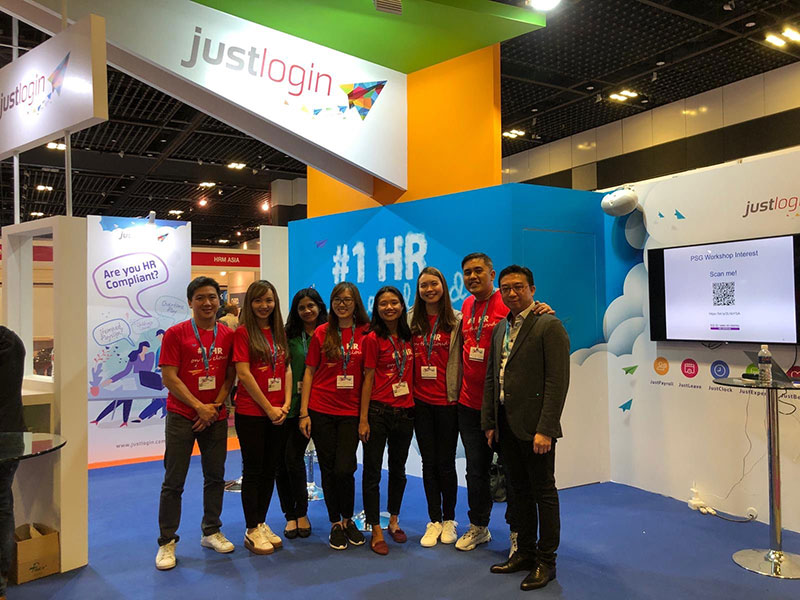It’s hard to believe only a few decades ago, computers were still a luxury item for most individuals. And many businesses that were able to invest in the new technology could only do so on a limited basis.
In the 80s and 90s, the price of computers became much more affordable and the concept of software as a service (SaaS) was born and started to gain traction. As customers turned more and more to SaaS solutions to meet their business needs, competition between providers also increased exponentially.
In 2017, SaaS businesses reported they were battling for market share with about nine competitors within their first year. This was up from an average of 2.6 only a few years earlier.
Singapore is one of the most densely populated sovereign states and is no exception when it comes to fierce competition between SaaS businesses. HR software solution provider JustLogin knows this firsthand.
“We easily have up to ten HR software providers in this space serving five million people,” explains Chiou Hao Chan, JustLogin’s COO.
Despite the competition, JustLogin is celebrating its 20th anniversary in 2020. It’s also a well-established leader in Singapore’s HR software space.
So how has it stayed in the game for so long? By continually evolving its offerings to meet the growing HR needs of its customers.
Providing solutions for the four pillars of human resources
When JustLogin first began, it was focused on office and workflow automation, helping to change the landscape of HR departments with its solutions. Initially, the company was mainly focused on creating HR-related forms and providing the environment to distribute and process those forms electronically.
Over the years, as JustLogin continued to grow, HR personnel began asking for help with additional functions, such as leave applications and expense management. The company was happy to oblige.
Responding to market needs, JustLogin created solutions for what Chan calls, the “four pillars of HR”:
- payroll
- leave management
- time and attendance, and
- expense management.
Managing the complexities of employee schedules is no easy feat. In a perfect world, every employee would show up for work on time, work a full day, and clock out at the precise minute their workday was over. There would be no sick days, and no other extraneous factors, such as appointments, vacation days, overtime, and more.
And then, there are taxes and other benefits that need to be factored in.
“HR tech is unlike ordinary applications,” says Chan. “Our system has to understand and adhere to all mandates, such as social security regulations, labor laws, loss, etc.”
JustLogin now offers a full suite of award-winning applications to help simplify and streamline the HR processes of many small- to medium-sized businesses (SMBs). These apps include, JustPayroll, JustClock, JustPeople, JustExpense, JustBenefit, and JustLeave.
Additionally, the business is ISO 27001 certified.
JustLogin’s customer base is spread across a wide range of industries. And the company’s flexible solutions are as attractive to companies with fewer than 100 employees as they are to those with 1,000+ employees.
When homegrown billing is outgrown
For most of its business lifespan, JustLogin managed its accounting with QuickBooks Online and billing with a system created by an in-house developer.
“It was just a side project,” Chan says. “It wasn’t a full-fledged project that we invested tons of man hours into. We were just a one-person show trying to build a system.”
But as the business grew, manual billing became increasingly cumbersome for JustLogin team members—entering data into their own system, transferring it to QuickBooks, verifying the information, and then generating the invoices.
With its previous system, it took the company’s finance team about two weeks to process invoices for a few hundred customers. This lengthy timeframe was a point of frustration for customers.
Chan explains.
“We usually give our customers 30 days to pay. If we were able to issue the invoice on the first day, that would give us 30 days to collect the payment.”
Consequently, customers would complain they were receiving invoices as much as two weeks into their 30-day payment terms.
And those billing challenges didn’t even account for multiple pricing options.
Multiple subscription plans call for pricing flexibility
Chan’s career has always been in the internet and SaaS industry. In fact, he was one of the first Asia-based employees for Salesforce.
I’ve seen how a SaaS model should work,” he says. “SaaS billing is a challenge because it is very different from a normal billing cycle. You have different subscription plans, and you have different configurations.”
When Chan started working with JustLogin about five years ago, he immediately saw problems brewing with the company’s billing practices.
Back then JustLogin was selling its software as a static, prepackaged solution that included all its different modules. And every user within a subscription was billed for every module, even if they only really required access to one or two. The solution was less than flexible.
“I realized this would be a problem once we started scaling up the business,” says Chan. “So, I started looking for a solution.”

Selecting a flexible recurring billing solution
After looking at different subscription billing solutions, JustLogin reached across the globe to team up with Stax Bill. And once the company set up its customers in its new subscription billing platform, the results were evident out of the gates.
JustLogin is now able to send invoices on the first day of its billing cycle.
“At the turn of the clock at midnight of day one, we’ve sent our invoices,” Chan said.
Payments come in more quickly too, because the company can give customers the option to pay via credit card. Previous payment options were limited to checks or bank transfers.
Even processing checks and bank transfer payments now takes less time with Stax Bill’s system in place, says Chan.
Having more flexibility with its pricing options has helped JustLogin break away from the ‘prepackaged’ pricing of its past as well. This new flexibility gives the company a competitive advantage.
Before Stax Bill, Chan says, “Our salespeople could not truly sell because they couldn’t get creative with deal-making.”
In a region where deals and negotiating prices is commonplace, this was extremely constricting for the SaaS business.
“We were limited in how we could bundle a solution because we just could not cope with our billing system,” he adds. “If we were creative with our deals, then we had to manually enter those into the old system.”
Now, pricing flexibility is fully supported.
With Stax Bill implemented, JustLogin can manage its customer subscriptions at very granular level, says Chan. For example, it can easily manage which users are activated for which of its modules and at what specific pricing.
“It allows us to structure interesting deals for different tiers. We can do stairstep pricing or incorporate tiered pricing options. With this flexibility, we can do volume pricing and so forth.”
These are just a few things that have helped JustLogin’s selling strategy, says Chan.
Successful scaling with the right billing software
Since partnering with Stax Bill, JustLogin has scaled its business 3X, and it did this seamlessly without putting unnecessary pressure on its billing department.
As previously mentioned, it once took JustLogin two or three people working overtime for two weeks to bill 800 customers. These man hours have been freed up since transitioning to the Stax Bill platform. And even growing to 2,400 customers, the company’s employees never had to go back to working long hours to generate invoices.
Implementing an automated billing system has also resulted in a reduction in invoicing errors, and has freed up a significant amount of time for the JustLogin finance team, says Chan. Since team members spend less time on billing, they can focus more time following up on payments and working on other financial responsibilities.
We now do more volume business with the same amount of team members,” he says.
And when customers contact JustLogin, issues are resolved quickly, making for higher customer satisfaction.
“The finance team is able to cope with any issues much, much faster than before,” says Chan. “I would say in terms of customer satisfaction and customer general response, we are able to pacify an irritated customer much faster than we were in the past,” he says.

Looking toward future growth
Already a leader in the Singapore region’s HR software ecosystem, Chan and the JustLogin team are looking toward future growth.
I’m quite sure that we’re probably the only vendors in this space that has properly implemented a billing system,” says Chan. “Versus our competitors, I think we’re definitely the star of the class in terms of billing.”
Confident the company can handle adding to its customer base, JustLogin is looking at moving into other geographic areas—growth that will be supported by Stax Bill’s pliability with other payment options.
“We’re going to places like Hong Kong, Myanmar, and Malaysia in the next 12 to 18 months,” says Chan. “We see Stax Bill as a nice platform for us to expand regionally because of its capability to handle multiple currencies, different taxation structures, and so forth. Now that we have implemented Stax Bill, I think it has provided us with the confidence to go into regional markets to handle the billing as effectively as it has to date.”








